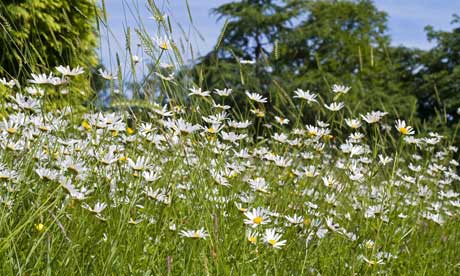hajibehzad
کاربر برگزیده علوم گیاهی
- Camila Ruz
- guardian.co.uk, Wednesday 17 August 2011 07.00 BST
- Article history

Kew Gardens is launching a seed bank for native plant species that will help to protect and restore disappearing wildflower meadows in the UK.
The UK Native Seed Hub, an initiative from Kew's Millennium Seed Bank, will provide high-quality seeds and scientific advice to groups growing wildflower meadows across the UK. The hub will then go on to support the restoration of 40 other native habitats such as chalk grasslands and lowland heathland.
The first meadows will be restored by a collaboration between Kew and the High Weald Landscape Trust's Weald meadows initiative in West Sus***. Species to be reintroduced include the harebell (Campanula rotundifolia), oxeye daisy (Leucanthemum vulgare) and sneezewort (Achillea ptarmica). Robin Probert, head of technology and training at Kew, said: "This is habitat that has suffered the most over the past decades … only about 2% of the old species-rich meadows are left since the second world war."
The UK Native Seed Hub will consist of a seed store and one hectare of seed production beds. Temporary seed beds will be open to the public until September at Wakehurst Place, Kew's West Sus*** location. A new lowland meadow has also been planted outside the Millennium Seed Bank.
"What we'll do is hold these collections in our seed bank and take them through the first critical stage of multiplication so we will end up with a larger quantity of high-quality seeds that we can make available to commercial seed companies," said Probert. "They can then produce the large volumes of plants that are required."
One of the species worked on this year is the devil's-bit scabious, a medicinal plant native to the UK. "It's a desirable species in lowland meadows but it turns out that it's quite difficult to germinate and some of these seed companies have struggled," said Probert.
Another species, devil's-bit scabious, has evolved to germinate only in spring after a long period of winter chilling. "A problem that we were able to solve through our own germination studies with our conservationcollections. We can now share that knowledge with our commercial partners and hopefully that plant will become more readily available in the future," he said.
Wildflower meadows were once common in the UK but changes to farming practices after the second world war have meant they have almost disappeared. Fragments of meadows survive in areas that have not been heavily ploughed, re-seeded or heavily fertilised. These meadow flowers provide important nectar for pollinating insects such as bees and provide a diverse habitat for other insect species and birds.
Kew's Millennium Seed Bank is the largest wild plant seed bank in the world and has conserved seed from 30,000 species across the globe. It also safeguards 90% of UK species in its vaults. The seed bank has already proved crucial in protecting native species by helping to re-introduce threatened plants to new areas of the UK. The endangered triangular club rush and the critically endangered starved wood sedge were both successfully reintroduced last year.
